The Checker Maven
The World's Most Widely Read Checkers and Draughts Publication
Bob Newell, Editor-in-Chief
Published each Saturday morning in Honolulu, Hawai`i
Contests in Progress:
The Dodger
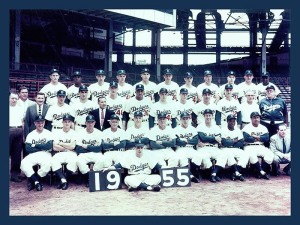
At the time that this article achieves publication, it will be near the end of the 2005 baseball season. But, since quite a few of our pieces are written well in advance, we don't know at the moment who the pennant contenders might be.
The Dodgers, of course, were in the running for many a year. We're referring, naturally, to the immortal Brooklyn Dodgers, the "Brooklyn Bums" beloved of many a checker player, including Willie Ryan and, we're certain, Tommie Wiswell.
In fact, today's feature problem is called "The Dodger" though it doesn't have any sort of baseball theme that we can readily discern. Here's the situation:
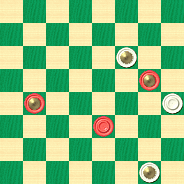
WHITE
White to Play and Win
"Dodge" erroneous play, win the pennant for White, and check your answer by clicking on Read More.![]()
A Wiswell Doubleheader


Today we bring you two Tom Wiswell problems--- a doubleheader--- which bear a certain relationship. If you solve the first one, it will help you with at least one major variant of the second one.
But this doesn't mean that a "Sunday doubleheader" (alas, seldom seen these days) will turn into a "Sunday picnic." Not at all. In fact, when these problems appeared around sixty years back, there was plenty of discussion and controversy. In the end, Mr. Wiswell collaborated with one of the more colorful checker characters ever (next to Willie Ryan): Mr. Julius D'Orio, he of the "triangle" theory of checkers, to come up with a definitive solution.
And, as we shall see, modern computer analysis bears out the solution to what has been called the D'Orio-Wiswell Position.
BLACK
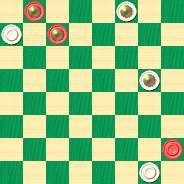
WHITE
White to Play and Win
Did you get that one? Now try this one:
BLACK
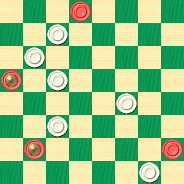
WHITE
White to Play and Win
White is two men up, so it's easy--- until you try it.
When you've played out both ends of the doubleheader, click on Read More for solutions and commentary.![]()
Fore!
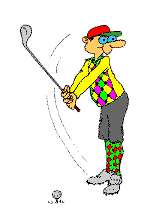
Oh ... we didn't really mean that kind of stroke, but actually this kind:
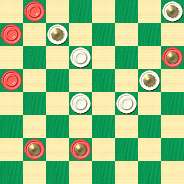
WHITE
White to Move and Win
Can you bring the solution to the "fore" with this month's somewhat easier stroke problem? Click on Read More to see if your solution is up to "par"!![]()
Simple Elegance

Complex stroke problems are fun, and crowded middle game positions can be a challenge, but there is little to compare with the sheer, simple elegance of a well-composed 2x2 end game problem. Here is a real classic, attributed to G. H. Slocum.
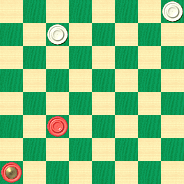
BLACK
Black to Play and Win
When you've solved this, we think you'll agree that there is genuine charm in such a compact position, requiring just the right play. Click on Read More to see the main line solution as originally published long ago.![]()
Two Not-Quite-So-Easy Pieces
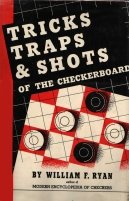
We've been slowly but surely republishing Willie Ryan's Tricks Traps & Shots of the Checkerboard in a brand new electronic edition, and we've been referring to the introductory problems in the book as "Easy Pieces."
Well, some readers have pointed out that not all of these problems have been exactly easy, and that they've been getting harder as they go. So, this month, we're abandoning any pretense of ease of solution, and again letting Willie speak for himself. Try the problems and check your answers by clicking on Read More. As usual, the Black side is shown in regulation Red.
They may not be easy, but they certainly are good!
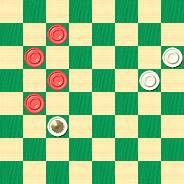
BLACK
Black to Play and Win
"A little logic should make the issue clear in Example 13. Black is a piece ahead, but the white king on square 11 is pressing (chasing) an attack from the rear. The natural course for black is to avoid capture by going 16-20, white chasing 11-16, black running 19-23, white pursuing 16-19, and there you have it---black seemingly must lose the piece on 23 or 24. That's the apparent outcome of the situation, but actually black can win in five of his own moves by trapping white on a two-way double or 'optional take.' The one thing to keep foremost in mind, when you are a piece ahead and your opponent is threatening to retrieve it, is to look for an idea that will make the retrieve fatal!"
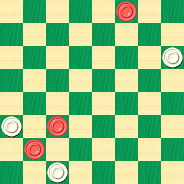
WHITE
White to Play and Win
"One does not master mathematics by studying trigonometry, solid geometry, or analytics at the start. The would-be mathematician must first ground himself in the basic study of addition, multiplication, subtraction, and division before he can cope with the abstract phases of advanced mathematics. Similarly, one cannot become an adept checker strategist without extensive training in the art of tactics. Look at the three-by-three ending in Example 14, by the well-known American problemist, Paul R. Semple, of Martins Ferry, Ohio. Can you take the white pieces, and without moving a piece, win in ten moves by executing a 'throwback two-for-one'? If you can't, don't divert your study to any other phase of the game until you can see through these snap traps in the twinkling of an eye!"![]()
Autumn is Coming On Fast

After you've worked out the answer, click on Read More to verify your solution. We're giving you a much easier problem after August's brain twisters.
By the way, we're desperately short of good speed problems (which is why we only have one today). We have a number of bad speed problems, but they won't do! If you have nice some favorites, please send them our way.
September Speed (fairly easy)
[Read More]School Bells Ring, and Children Sing ...

... it's back to checker school again!
Throughout the USA and Canada, and much of the western world, school bells are ringing and children are heading back to school after the long summer vacation. No doubt checker practice will quickly begin in earnest as all of the elementary school, middle school, and high school checker teams prepare for battle in the upcoming checker season.
It seems appropriate, then, that we continue our ongoing Checker School series with another installment from Ben Boland's classic Famous Positions. In this lesson, we'll look at Wardell's Position, which is akin to First Position, but the win is obtained without the winning side having "The Move." Unclear? Well, pay attention in class!
Red
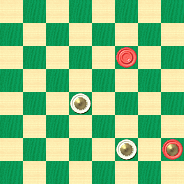
White
White to Play and Win
When you've tried the problem, click on Read More to see Mr. Boland's solution, a game run-up, and some great notes and commentary.
Extra (non-checker) points if you can give the source for "School Bells Ring and Children Sing" and quote the rest of the jingle.
[Read More]Eyes Only


WHITE
White to Play and Win
When you either have the solution, or have had enough, click on Read More to learn the winning way.
[Read More]Faster Than a Speeding --- Turtle?
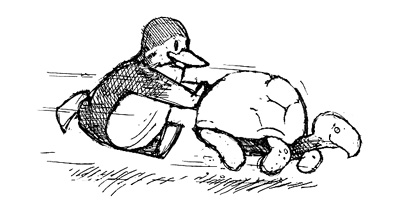
Toe up to the starting line and click below to display the problems and start the clock. Good luck! You can check your solutions by clicking on Read More. Afterwards, click here to cast your vote for the type of speed problems you prefer.
(This article has been edited subsequent to original publication due to valuable reader input. As a result you have three problems instead of two!)
Problem One (very hard for a timed problem)
Problem Two (medium difficulty, original erroneous diagram corrected)
Problem Three (quite hard, as originally published)
[Read More]In the Grand Manner

Along with the Grand Old Game, there is little that is as wonderful as Grand Opera, performed by a truly world class company such as we are privileged to have here in Santa Fe.
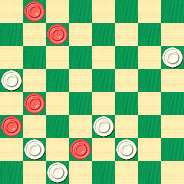
White
White to Play and Win
Just a word of caution: today's problem is "grand" in terms of difficulty as well as content. If you solve it, congratulations --- you might wish to reward yourself with a front row seat at the Santa Fe Opera!
[Read More]The Checker Maven is produced at editorial offices in Honolulu, Hawai`i, as a completely non-commercial public service from which no profit is obtained or sought. Original material is Copyright © 2004-2024 Avi Gobbler Publishing. Other material is the property of the respective owners. Information presented on this site is offered as-is, at no cost, and bears no express or implied warranty as to accuracy or usability. You agree that you use such information entirely at your own risk. No liabilities of any kind under any legal theory whatsoever are accepted. The Checker Maven is dedicated to the memory of Mr. Bob Newell, Sr.

